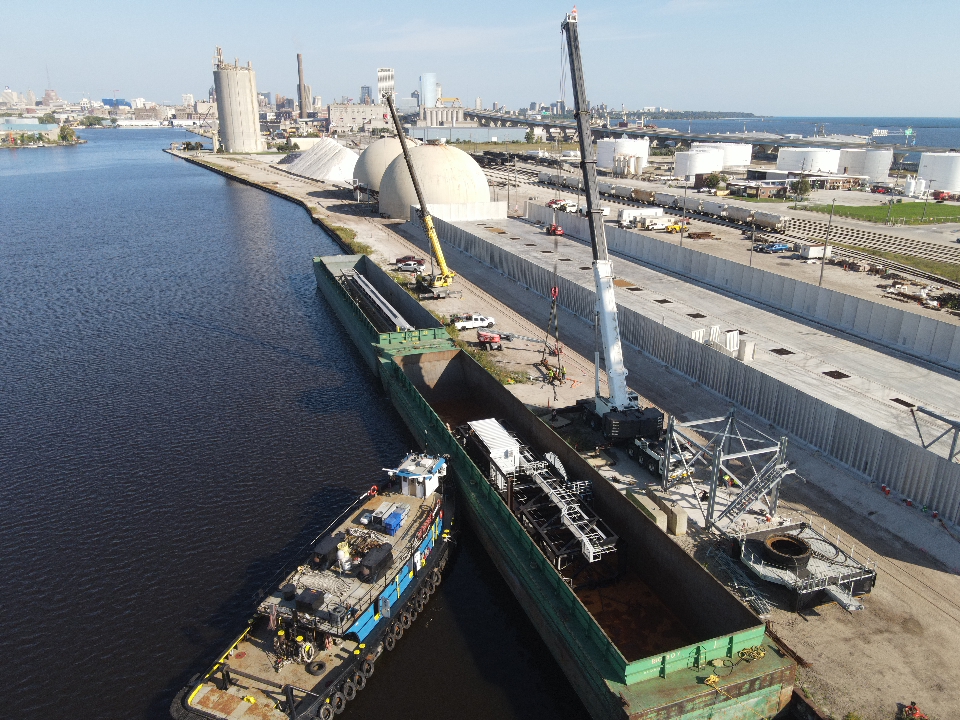With Tariff Threat, Port Milwaukee Benefiting From Interest in Little Known Federal Trade Program
But tariffs and other Trump changes could damage port's overall business.
How do you turn a slice of southeastern Wisconsin into foreign soil?
Call Port Milwaukee.
And with sweeping tariffs proposed by President Donald Trump, plenty of area businesses have been picking up the phone.
“It has been extremely active… We are currently talking to 15 companies,” said market development manager Maria Cartier to the board of the Harbor Commission on April 10.
“Last year we had maybe two inquiries the whole year,” said Port Director Jackie Q. Carter.
The port’s designation as “Foreign Trade Zone 41” (FTZ 41) allows certified companies to designate a portion of their facility as if it were outside of U.S. territory, delaying, avoiding or reducing tariffs and other fees. The program is overseen by U.S. Customs and Border Protection.
There are currently five active operators in FTZ 41. According to the port, the trade zone supported 2,700 jobs and saw $3.7 billion of merchandise moved.
“It allows them to reduce, defer or eliminate import duties and taxes,” said Cartier in summarizing the utility of the program. There is an additional benefit for companies that bring in supplies across multiple shipments. “Every time a business brings in commodities, they have to do documentation and processing. It allows you to consolidate rather than doing it individually, saving on operating costs.”
Companies can assemble components into a finished good that have a different tariff or tax rate or they can delay declaring the item until it is ready for market. Goods can also be rexported to avoid tariffs. Cartier said one of the operators previously accepted foreign-made COVID-19 vaccines and was able to delay paying fees associated with their import until the Food & Drug Administration granted approval of the drug.
The goods do not have to be held at the port, but are instead in certified areas in a company’s facilities. The goods also do not need to transit through the physical port to qualify.
The port makes an administrative fee. Companies must also hire attorneys and consultants to set up and monitor their program compliance.
“Our current operators have been helpful,” said Cartier about how the new operators have been found. The current companies utilizing the designation are Broan Nu-Tone CNH Industrial Americas, Hospira, LLC, Mercury Marine and Lindner Logistics
Five companies have submitted formal requests.
A Port Milwaukee presentation said that five of the 15 applicants were in Kenosha County, four in Milwaukee, three in Waukesha, two in Washington and one in Ozaukee.
More information about FTZ 41 is available on the Port Milwaukee website.
Other Changes Pose Great Risks
And while tariffs could be a boon for the FTZ program, they could devastate general port traffic.
“We are concerned,” said Carter in making her director’s report. “There will be some international shipping impacts with those… most of what Port Milwaukee is is imports.”
But the biggest concern for Carter is Section 301 tariffs and an associated attempt to get back to American shipbuilding.
“Everyone would love to see that,” said Carter. But, an early Trump administration proposal threatened all Great Lakes ports. “The issue is the timing.” Most of the vessels that call on Milwaukee are foreign-made, with only the aging Great Lakes vessels being American made.
“The way that it was initially proposed was to enact these exorbitant fees on vessels that would really take us out of the game,” she said. Carter said the fee structure didn’t work for the smaller vessels that call on Great Lakes ports. The international vessels, she said, make several port calls on each trip to the Great Lakes instead of a turnaround at one large port and would have need to pay a large fee at each port.
A reprieve came when an executive order delayed implementation.
“We did get some home with that executive order yesterday that they’re really going to take this and do more analysis,” she said.
“If we can remind them purple states are impacted by this, that might help,” said commission chair Timothy Hoelter.
Carter said the coalition of ports is working to make its case using specific customers, including how DeLong Company‘s new agricultural export facility benefits farmers spread across the state.
If you think stories like this are important, become a member of Urban Milwaukee and help support real, independent journalism. Plus you get some cool added benefits.



















